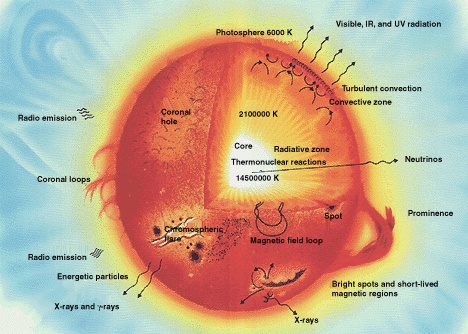This time I have used bold for comments. Rather than use reply, I think it is best just to copy and paste into a new box, which is what I have done here. You can then reduce my bold comments, or background colour or whatever, and put your new comments in bold.
I like the bold. Easier to see what I need to read.
"How does big bang explain the presence of hydrogen?"
The big bang actually predicts the initial composition quite closely.
Does it? My theory has a reasonable claim too. Can you go into more detail for hydrogen and helium at the sun's atmosphere? I did not think hydrogen was a byproduct of nuclear fusion. I thought hydrogen would be consumed. Helium is very light and makes sense in any atmosphere in my uniformed mind, that is why it is used in product conformance product testing.
Answers here in green: I think that the refs I gave you explained this. From the melee arising from the BB, the simplest elements.
Therefore mostly H (nearly 3/4) then He (about 1/4) with small amounts of higher elements like Lithium were formed. Since the first molecular (or elemental) cloud contained these elements, it is to be expected that
stars contain these in the same proportions originally. As the Universe progressed, higher elements were formed like carbon, to begin with. This process continued up to iron (Fe) with energy being given out all the time. After Fe it was necessary to put energy in, which is why there are fewer heavier elements (like gold, silver, platinum, etcetera).
Stars are mostly H and He to begin with, so obviously that is why their atmospheres contain these elements.
From your article "The problem at this point was that electrons couldn’t stay in orbit around any atomic nucleus because of the immense heat and radiation still flooding the universe. Shortly after any neutral atoms would form (neutral atoms simply contain the same number of protons and electrons, and thus carry no overall charge), they were knocked apart again by energetic radiation."
Simple elements, H and He, were formed first. Is it essentially being created and destroyed before it lands on whatever.
No. Once H and He are stable, then they form about 98% of the mass. Gravity holds the star together. It takes literally billions of years to use up all these. Do not think of Earth's atmosphere, where H and He leaked away long ago. In a star they are there for billions of years.
Your answers really help clarify the process of a star from a big bang perspective for me thank you. For some reason I can usually swim but my basics are atrocious and I can be slow sometimes.
No problem. Simple elements form first, that makes reasonable sense. More complex takes more time. up until Iron then they require energy. I am clear on this point. I think.
OK.
Is there a by product to nuclear fusion hydrogen and helium reactions?
Yes, the first is carbon, then nitrogen and oxygen. H and He make small building bricks, and these building bricks make larger building bricks up to iron. Then iron builds up up gold etcetera. Stage by stage, bigger and bigger elements.
*********************************************************************************
Sorry, I can't change the blue in quoted extracts.
*********************************************************************************
How did the Big Bang produce hydrogen?
Hydrogen didn't appear until the universe had spread out — and subsequently cooled — enough for the first protons and neutrons, and later simple atoms, to form. ... Within about 3 minutes after the
Big Bang, conditions cooled enough for these protons and neutrons to form
hydrogen nuclei.12 Dec 2018
How did the first element form after the Big Bang? - Astronomy ...
https://astronomy.com › magazine › ask-astro › 2018/12
******************************************************************************
I did not think hydrogen was a byproduct of nuclear fusion. I thought hydrogen would be consumed. Helium is very light
I never said that it was a by product of nuclear fusion. First hydrogen (H) and then helium (He) are consumed, which is the longest process in most star history. They are fuel (reactants) not products of the fusion process.
What are the by products of a fusion helium hydrogen reaction?
See above.
This can easily last 8-10 billion years***.
If they are fuel H and He would be consumed and not present at the atmosphere of the star***.
They would be present at the reactive level. Correct? Hydrogen and helium make sense in the atmosphere in my theory. Hydrogen from burning hydrocarbons is a clean argument.
No. Carbon monoxide or dioxide? I suck at basics. In reactions I think something is released and guess wrong often.
In burning - which does not happen in stars. It is nuclear fusion - carbon reacts with oxygen. If there is enough oxygen you get CO2, insufficient CO (monoxide) - but this has nothing to do with stars.
So if Earth were to spontaneously combust do you think the atmosphere would be similar to that of a star? The evaporation of the earths oceans would create hydrogen potentially?
Totally, totally wrong. Most of Earth would not combust. Any combustion products would be oxides. The atmosphere would be gaseous oxides like CO and CO2. A star, for most of its life consists of H and He. These are gases on Earth, but in a star they are retained by the enormous gravity and do not 'fly away' like they would from Earth.
What if there was a supernova event for the sun? Would it blow Earth's oceans into a gas state and potentially ignite the hydrocarbon layer? Too speculative?
I just have trouble seeing how hydrogen sticks to a star but hydrogen has a ton of unusual properties and you have done an admirable job explaining.
Gravity - see above. There is so much hydrogen stars burn a long time but Mars and the moon don't have significant hydrogen deposits. How do barren planets fit in?
The Solar System has a boundary condition known as the frost line (sometimes called ice line or similar. It is very simply the boundary between where planets are comparatively hot and lose all their light gases (H and He) and comparatively cold, where they retain these. Mercury, Venus, Earth, and Mars are inside the line, and so are comparatively hot, and have lost virtually all their H and He. The Sun is very very hot, but its enormous gravity keeps its H and He. Outside the frost line, the planets are much larger - but this is only because it is very cold and they keep H and He. If they lost these, then what was left would probably not be very different from the inner planets.
Incredible explanation. The center of a star is it gas or solid? Similar to earth's core or no?
Thanks,
Parker
***Yes, but
the reaction period can easily last 8-10 billion years***
Remember that the stars (especially the early ones) were almost entirely made of H and He.
It took billions of years to react. The hydrogen was already there.
Burning hydrocarbons does not yield hydrogen, it produces water and carbon dioxide.
CH4 + 2O2 --> CO2 + 2H2O
So in the big event
This all makes sense thanks for the lesson. I'm an idiot. I know.
You are not.
I came up with a name for OUR new big bang theory. The name big bang theory is actually really good. It's a branding obstacle. So I think WE need to go big or go home. What does the world love? Arrogant Americans?! It has some precedent and that civilized American's would like to apologize. But whatever it is, is winning so,
I still have only the beginning of what you are talking about. Some of it, so far, does not seem that well founded. But let me understand it first.
The Bangtown USA Theory
It would make the news with a splashy name. My countrymen would think I walk on water. Yours may say you had it coming to you and I could reclaim all the financial rewards potentially. Or a couple old guys ca n just have a laugh.
Don't get too excited. So far I don't see any theory, just a few ideas. Do you want to send me an "executive summary"? That would give me some coherent perspective.
I think this is a good idea. I will prepare a document and send your way. I really appreciate your help and time. This way you can help me polish rough edges or delete fantasy concepts (or the entire concept). And we can see if something of substance comes together. Thank you for entertaining my idea and sharing your wealth of knowledge.
Thanks,
Parker




